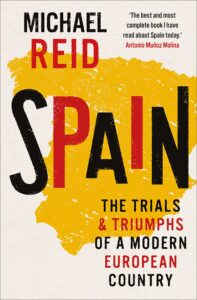 Michael Reid’s “Spain: The Trials and Triumphs of a Modern European Country,” reminds us that post-Franco democracy was “not imposed by conquering foreign armies, as in Germany or Italy” after World War II. Rather it was the homegrown fruit of Spain’s own common sense, nurtured through agreements between “moderate supporters of the dictatorship and a realistic democratic opposition,” The Wall Street Journal’s Tunku Varadarajan writes:
Michael Reid’s “Spain: The Trials and Triumphs of a Modern European Country,” reminds us that post-Franco democracy was “not imposed by conquering foreign armies, as in Germany or Italy” after World War II. Rather it was the homegrown fruit of Spain’s own common sense, nurtured through agreements between “moderate supporters of the dictatorship and a realistic democratic opposition,” The Wall Street Journal’s Tunku Varadarajan writes:
The civic wisdom of the burguesía—the Spanish bourgeoisie—gave rise to a “largely seamless transition” from a paternalistic Catholic dictatorship (which had lasted from 1939 to 1975) to a modern, liberal democracy, one that matches Scandinavia for its personal freedoms and surpasses any other in Europe in the granting of wide-ranging autonomy to its regions….The aplomb with which Spaniards—who you’d think would be locked into uncompromising hatreds after 36 years of Franco—overcame their distaste for those with whom they disagreed suggests that Spain may well be the most impressively democratic major country in mainland Europe.
As Reid points out, Spain is not alone among democracies (the UK is a prime case) in suffering from ‘hubris, austerity, populism, polarisation, poor leadership and the struggle to adapt to a rapidly changing world of globalisation and technological change’, William Chislett observes. Spain’s ills, he says, are not ‘principally due to any original sin surrounding the birth of its democracy’ and it is not ‘burdened by an atavistic exceptionalism nor by Franco’s ghost’.
Reid is particularly good on Spain’s transition to democracy in the late 1970s, accomplished by moderates in the Franco regime “who knew that social peace and integration into Europe required democracy” and an opposition “rendered pragmatic” by exile, prison or self-censorship under Franco, Varadarajan adds.
Spain’s democratic transition was a source of #renewal for country long beset by violent division and dictatorial rule, @WSJ‘s @tunkuv observes. https://t.co/b0rN2LxjJZ via @WSJBooks
— Democracy Digest (@demdigest) July 14, 2023







